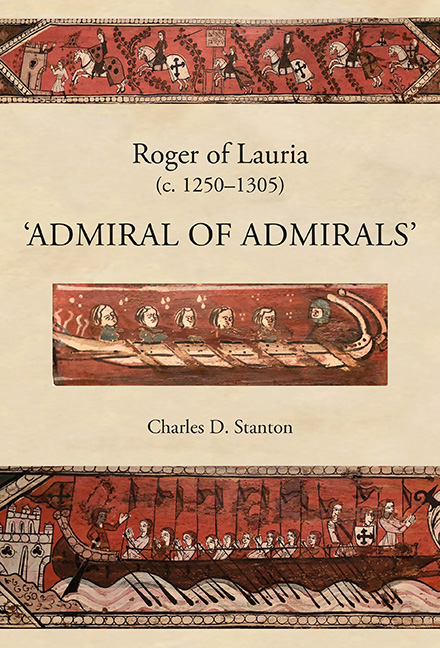Book contents
- Frontmatter
- Dedication
- Contents
- List of Illustrations
- Prologue
- 1 Battle of Benevento (26 February 1266)
- 2 A Calabrian Exile in the Court of Aragon (1262–1282)
- 3 Battle of Tagliacozzo (23 August 1268)
- 4 Aragonese Expansion (1229–1282)
- 5 Angevin Consolidation and Aggrandizement (1268–1282)
- 6 Revolt of the Vespers (30 March 1282)
- 7 Aragonese Intervention (August–October 1282)
- 8 Stalemate (November 1282–March 1283)
- 9 Admiral of Aragon (20 April 1283)
- 10 The Opposing Fleets (1282–1302)
- 11 Battle of Malta (8 June 1283)
- 12 Anjou's Dreams of Empire Dashed (June–November 1284)
- 13 France's Crusade Against Aragon (May–November 1285)
- 14 Battle of the Counts (23 June 1287)
- 15 Truces and Treaties (June 1287–November 1291)
- 16 Raid on Romania (Summer 1292)
- 17 Switching Sides (December 1293–April 1297)
- 18 Aragon's Invasion of Sicily at Anjou's Bidding (1298/1299)
- 19 Lauria's Last Great Campaign (Summer 1299–Spring 1300)
- 20 Endgame (Spring 1301–Summer 1302)
- Epilogue
- Bibliography
- Index
9 - Admiral of Aragon (20 April 1283)
Published online by Cambridge University Press: 24 October 2019
- Frontmatter
- Dedication
- Contents
- List of Illustrations
- Prologue
- 1 Battle of Benevento (26 February 1266)
- 2 A Calabrian Exile in the Court of Aragon (1262–1282)
- 3 Battle of Tagliacozzo (23 August 1268)
- 4 Aragonese Expansion (1229–1282)
- 5 Angevin Consolidation and Aggrandizement (1268–1282)
- 6 Revolt of the Vespers (30 March 1282)
- 7 Aragonese Intervention (August–October 1282)
- 8 Stalemate (November 1282–March 1283)
- 9 Admiral of Aragon (20 April 1283)
- 10 The Opposing Fleets (1282–1302)
- 11 Battle of Malta (8 June 1283)
- 12 Anjou's Dreams of Empire Dashed (June–November 1284)
- 13 France's Crusade Against Aragon (May–November 1285)
- 14 Battle of the Counts (23 June 1287)
- 15 Truces and Treaties (June 1287–November 1291)
- 16 Raid on Romania (Summer 1292)
- 17 Switching Sides (December 1293–April 1297)
- 18 Aragon's Invasion of Sicily at Anjou's Bidding (1298/1299)
- 19 Lauria's Last Great Campaign (Summer 1299–Spring 1300)
- 20 Endgame (Spring 1301–Summer 1302)
- Epilogue
- Bibliography
- Index
Summary
IN APRIL 1283, PETER OF ARAGON must have realized that the war with Anjou over the destiny of Sicily had reached a pivotal point. While Charles had temporarily been ejected from the island and put on the defensive in Calabria, Peter had reached the limit of his capabilities to advance further. Moreover, the great Capetian lord enjoyed prodigious advantages in manpower and military resources. He could draw upon immense domains that extended from Anjou in the French heartland to Achaea in the Greek Peloponnesus. His allies, Pope Martin IV and King Philip III of France, were two of the most powerful personages in Europe at the time, and they had already announced through concerted action their unstinting support of his cause.
At the same time, Peter could call upon only his loyal Catalans and his already beleaguered Sicilian subjects, even as the fractious Aragonese nobility continued to resist his every entreaty for support. He could not possibly hope to match Anjou's ground forces in the field. His only means of levelling the contest was with naval power. Even then, Aragon faced daunting odds. The Angevin registers reveal that Charles had called for at least two hundred galleys to be equipped and ready for action in the months of April and May. The Siculo-Aragonese fleet would soon be dwarfed by its Angevin counterpart. Peter's only option was to compensate with the quality of his crews and superior leadership. He made sure to deal with both issues prior to setting sail back to Barcelona.
Peter began by summoning Queen Constance from Catalonia to rule Sicily in his stead. While he was still in Calabria, he had heard rumblings of revolt on the island fomented on behalf of Charles by Walter of Caltagirone, Lord of Butera. The insurrection never fully materialized but the possibility instructed Peter to leave a firm hand that he could trust to tend to the kingdom's affairs in his absence. Constance arrived in Messina on 16 April with sons James and Frederick in tow, along with daughter Yolanda (Violante in Italian) and adviser John da Procida. Three days later, Peter convoked a parliament in that city in which he proclaimed the queen as regent while he concerned himself with the tournament in Bordeaux.
- Type
- Chapter
- Information
- Roger of Lauria (c.1250–1305)‘Admiral of Admirals’, pp. 115 - 125Publisher: Boydell & BrewerPrint publication year: 2019



